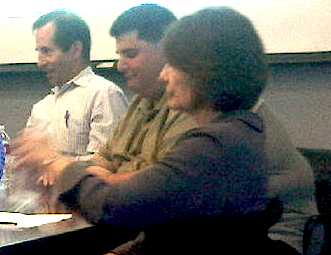One Overpaid City Manager, Two Reporters And An Incredible Experience

Two reporters walk into a bar.
And everyone inside gets up, walks to the door and awaits the opportunity to shake their hands.
The warm and appreciative reception Los Angeles Times reporters Jeff Gottlieb and Ruben Vives received one night at a bar in the City of Bell speaks to the impact a few rumors, hundreds of public records and one overpaid city manager have had this summer.
Vives had spent countless evenings covering city council meetings in southeast Los Angeles, but for so long nothing seemed out of the ordinary, he said Tuesday to a gathering of students, faculty members and staff at the USC Annenberg School for Communication and Journalism.
At one council meeting early in the summer, the City of Maywood decided that it would layoff all city employees because the city's poor finances prevented it from receiving insurance. Vives decided to see if there was anything else falling in Maywood's sinking ship. He enlisted the help of Gottlieb, the Times' reporter for South Bay communities.
Initially, Gottlieb called the L.A. County District Attorney's Office to see if there was any trouble in Maywood. As it turned out, there wasn't. But the District Attorney's Office did acknowledge that a neighboring city, Bell, had city council members who were oddly earning more than $100,000 annually.
Presented with brand new information, Vives' attention shifted from Maywood to Bell.
The few community activists that existed then in a city where half of the residents are foreign-born and many do not even have high school degrees started offering their own tales about Bell's city manager, Robert Rizzo, collecting a high salary.
Vives and Gottlieb showed up at city hall and pressed Rizzo to speak to them.
“When he wouldn't come out, it was like ding, ding, ding,” Gottlieb said.
Bell's city clerk was slow to hand over city council minutes from previous meetings; minutes from meetings during the last five years requested in mid-June just arrived at the Times on Monday.
The story reached a new level when the city clerk called Gottlieb and Vives in late June. Rizzo wanted to talk to them in a hall at a city park. Some documents the Times had requested would be turned over at the meeting.
As it turned out, they received much more. At the four-hour-long roundtable meeting with the city manager, the police chief, the city attorney, several assistants and two private laywers, Gottlieb asked each city official one-by-one, how much they made.
Rizzo's answer: $700,000.
To which, Vives blurted out, “Jesus Christ!”
And to which, Gottlieb needed a second hearing to truly comprehend.
“It's sort of like Christmas Day when you get a gift like that,” said Kimi Yoshino, the Times' morning editor.
Gottlieb said to Rizzo that he's probably the highest-paid city manager in L.A. County.
“I know, I probably I am,” Rizzo said back.
Since that moment, Rizzo, Bell's mayor and a handful of fellow city leaders have maintained a defense of their high pay. Parks such as the one at which the meeting occurred and improvements to city streets have been cited as justification for six-figure salaries.
Rizzo has said to Gottlieb that he rescued a city on the brink of bankruptcy and made changes to insure a positive flow of cash into the city. However, those are not the only things he did during his tenure.
Gottlieb said it took him a month to unwind Rizzo's masterful planning of employment contracts. With built-in raises, constantly changing compensation rates and addendum after addendum, Rizzo made it hard for others to discern exactly how much was going into his pocket at the end of each month.
Finished with the math, Gottlieb provided Rizzo a chance to correct any mistakes in his calculation that Rizzo was earning $787,000.
“You may be $20,000 to $30,000 off, but it's okay,” Rizzo said.
He had no interest in explaining how to arrive at the corrected figure, Gottlieb said.
***
Within minutes of the story's publication, “Is A City Manager Worth $800,000?,” the emails started creeping into and then slowly taking over the inboxes of Vives and Gottlieb. Congratulations, thanks and even tips about more city officials from Redlands to Denver making more than they probably should.
“Astonishing,” Gottlieb called it.
Yoshino was marveled by how the story took off nation-wide.
“It ballooned into us taking closer look at all these cities,” Yoshino said. “Newspapers around the country started doing the same thing. It's really opened up the books, and we've seen a lot of sunshine all because of Bell.”
She said people realized they had a place to share their information, so they started picking up the phone and calling the Times.
“When people see movement and action, they become more responsive,” Yoshino said. “It's motivated the entire community in that area.”
Gottlieb and Vives eventually learned that the city had been blowing off residents' public records requests for most of the last decade.
“It's pretty clear Rizzo was covering things up,” Gottlieb said.
In a city such as Bell, where expectations of public participation in democracy are incredibly low, it's easy for city leaders to keep everyone but themselves in the dark.
The Times' reporters' persistence in demanding records from the city can not often be matched by even those who do participate in pubic affairs.
“Getting these documents online will make it much easier for community bloggers to see it,” said Shelby Grad, the city editor at the Times. “The bar would be lower for who would be able to get these things.”
Vives acknowledged though that if they had solely relied on documents, the story would have been different. Those many meetings that seemed ordinary gave him the chance to build relationships with the city council members and get their cell phone numbers.
When the story blew up, the numbers offered a chance to write with more perspective through quotes and anecdotes that paint a picture of tone-deaf city officials.
Hundreds of citizens crammed inside and outside of the first council meeting after the Times' lead story in the investigation. The people who showed up knew exactly who Vives and Gottlieb were. Vives was the first to arrive.
“They saw me, and the crowed just parted,” he said, pushing his arms off to either side.
Most gave him a pat on the back, some sought his autograph and a few community members hugged and kissed him in what turned out for him to be an unbelievably rewarding experience.
The experience isn't over. Each story about the pay scandal has spawned three new leads.
“We're lucky we got lots of tips after this, but we'll see when people get sick of this,” Grad said.
The two reporters who began the chase, their editors and the team of colleagues now also involved aren't sick yet. The scandal has been too gratifying for them.

From left, Gottlieb, Grad and Annenberg Journalism Director Geneva Overholser at the Annenberg event.
To reach reporter Paresh Dave, click here.
Find him on Twitter: @peard33.



